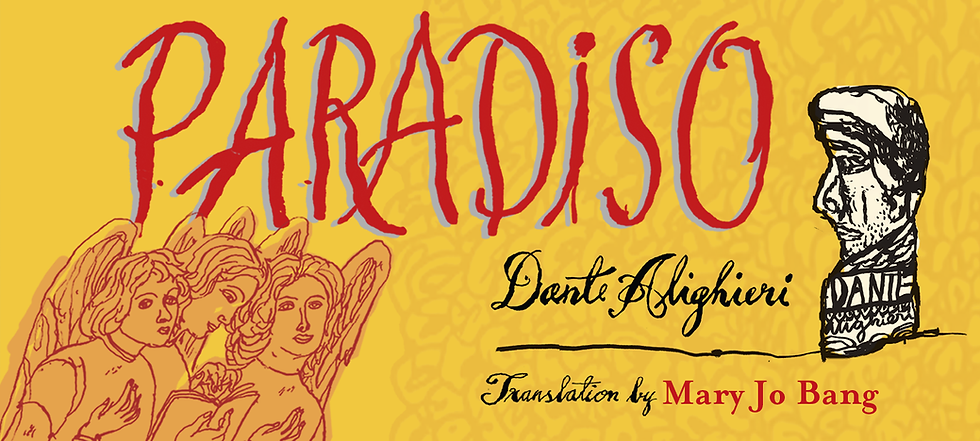

Paradiso
Mary Jo Bang’s translation of Paradiso completes her groundbreaking new version of Dante’s masterpiece, begun with Inferno and continued with Purgatorio. In Paradiso, Dante has been purified by his climb up the seven terraces of Mount Purgatory, and now, led by the luminous Beatrice, he begins his ascent through the nine celestial spheres of heaven toward the Empyrean, the mind of God. Along the way, we meet the souls of the blessed—those at various proximities to God, but all existing within the bliss of heaven’s perfect order. Philosophically rich, spiritually resonant, Paradiso is a reckoning with justice and morality from a time of ethical questioning and political division much like our own. In her lyric style and her illuminating notes, Bang has made The Divine Comedy for the twenty-first century.
NPR - Poet Mary Jo Bang reaches the end of her 20-year journey through Dante's 'Divine Comedy'
Click here for the full story!
“So, Reader, lift up your eyes with me / To the wheels above.’ With this, Mary Jo Bang welcomes us on a vertiginous ascent through the spheres of Dante’s Paradise.The translation is lush, alive, radiant—no small feat for a seven-hundred-year-old theological poem full of doctrinal speeches and bursting with nearly untranslatable neologisms. Bang renders these in warm and dynamic verse. The notes, too, are a garden of delights, sparkling with the wisdom, worldliness, and wit readers of Bang’s translations have become accustomed to. Here, she ups the ante of the previous two canticles: her Paradiso is learned without being showy, informed but not pedantic, accessible without losing its gravity, solemn but not lacking in joy. In its third installment, Bang’s experiment in transtextuality concludes with a triumph”
— Elizabeth Coggeshall, Editor, Dante Today
““For as long as I’ve known to look for him, Dante has been far from me. To some extent, this is inevitable—to an American living in the twenty-first century, Dante’s fourteenth-century Florence is a strange world.. English has seen beautiful translations of The Divine Comedy, but none can bring today’s reader closer to the poem than Mary Jo Bang’s. This is because Bang has recognized that the Comedy is a living poem, contemporaneous with all poetry that has followed it. Having translated it into a language alive to the very moment in which it is meant to be read, Bang has done the impossible: she has revitalized that which is eternal.”
— Shane McCrae, author of New and Collected Hell: A Poem
“As with her versions of Dante’s Inferno and Purgatorio, Mary Jo Bang’s succinct and lucid new version of Paradiso will attract many new readers to the poem. Her extensive commentary clarifies the more complex allusions and reflects close attention to Dante’s original text. Dante’s poetic language in Paradiso differs inventively and ambitiously from that of the previous two canticles, and by drawing from later sources, poets and songwriters among them, Bang shows once again how the life of The Divine Comedy is—as she quotes from Walter Benjamin—‘indebted to its afterlife.”
— Nick Havely, author of Dante’s British Public
Bang’s translation is uniquely here and now.”
- Kevin Young,
The New Yorker



